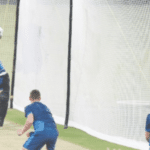On Wednesday, Iranian President Ebrahim Raisi came to an end of his official three-day tour to Pakistan, which included stops in Islamabad, Karachi, and Lahore.
At Karachi’s Jinnah International Airport, Sindh Governor Kamran Tessori, Chief Minister Murad Ali Shah, and Housing Minister Riaz Hussain Pirzada bid farewell to the Iranian president and his entourage, according to a report by Radio Pakistan.
At the invitation of his counterpart Ranil Wickremesinghe, Raisi departed for Colombo, Sri Lanka, on the subsequent leg of his visit of South Asia, according to Iran’s news agency IRNA. But according to Radio Pakistan, he departed for Iran.
The Foreign Office (FO) said in a statement that Raisi “concluded his maiden visit to Pakistan.”
“The two sides held productive discussions and agreed to advance bilateral cooperation in multiple domains, including in trade, connectivity, energy, and people-to-people contacts,” according to the statement made about his visit.
Second day goes to Lahore and Karachi
Raisi arrived in Lahore and Karachi on Tuesday, the second day of his tour. Both cities observed municipal holidays, which were declared in order to “avoid the consequent inconvenience to the general public.” Drones are strictly prohibited in the Karachi division from April 22 to April 28 according to the Sindh government.
Following his initial arrival in Lahore, the Iranian president met Governor Balighur Rehman and Punjab Chief Minister Maryam Nawaz.
Governor Rehman had thrown a luncheon in honor of the president and his entourage, and Raisi and Maryam had reiterated their dedication to promoting people-to-people interactions and cultural exchanges.
During his visit to Allama Iqbal’s mausoleum, the Iranian president also mentioned his “special connection” to Pakistanis and expressed his lack of feeling of strangerhood in the nation.
Later that day, Raisi arrived in Karachi, where he visited Governor Tessori and CM Murad to talk about business prospects between Iran and Pakistan.
Raisi had stated during his visit to Karachi that Tehran was prepared to share its industrial, scientific, and technological capabilities with Pakistan. He also reaffirmed his commitment to removing commercial restrictions between Iran and Pakistan.
Prior to his arrival, the government of Sindh had shut down all important highways, turned off cell phone service in numerous city neighborhoods, and stationed large units of police and Rangers across the city.
Drivers and commuters experienced difficulty and discomfort as a result of the traffic police’s early announcement of the closure of numerous major roads in Karachi, such as Sharea Faisal, Shahrah-i-Quaideen, and M.A. Jinnah Road.
Separately, the US State Department had issued a warning during Raisi’s travel to Pakistan, informing anybody thinking about doing business with Iran about the possible consequences of US sanctions, since Washington “forbids” commercial connections with Tehran.
When questioned about efforts to increase trade connections between Pakistan and Iran, the department’s Principal Deputy Spokesperson, Vedant Patel, said, “Let me say broadly we advise anyone considering business deals with Iran to be aware of the potential risk of sanctions.”
The US official continued, “But in the end, the Pakistani government can speak to their own foreign policy pursuits.”
First-day high-level meetings
Raisi had a full day on Monday in Islamabad, where the two parties agreed to raise trade volume to $10 billion over the following five years.
He had met with Prime Minister Shehbaz Sharif upon arriving in the capital and then spoke at a joint press conference, pledging to improve ties between the two nations at “high levels.”
Raisi later met President Asif Ali Zardari, with whom he agreed to strengthen current relations. The Iranian president spoke with General Asim Munir, Chief of Army Staff, about border security and regional stability.
While Interior Minister Mohsin Naqvi and his Iranian colleague Dr. Ahmad Vahidi agreed that both countries should outlaw terrorist organizations in their respective nations, Foreign Minister Ishaq Dar had also made a call to Raisi.
Eight agreements and Memorandums of Understanding (MoUs) for cooperation in a variety of disciplines were separately signed by the neighbors. Additionally, PM Shehbaz and Raisi renamed Iran Avenue, the freshly built segment of Islamabad’s 11th Avenue, and officially opened it.
importance of the visit
After Iran conducted an unprecedented missile and drone attack on Israel more than a week ago in response for an airstrike on the Iranian consulate building in Damascus earlier this month, Raisi’s journey to Pakistan had been called into question as Middle East tensions escalated. Then, on Friday, there was an apparent Israeli attack on central Iran.
Tehran has downplayed the alleged Israeli attack and said it has no intentions to retaliate, seeming to be aiming to prevent the Gaza crisis from becoming a regional battle.
All Middle Eastern countries have been urged by Pakistan to “exercise utmost restraint and move towards de-escalation.”
The visit by Raisi is particularly noteworthy as Pakistan and Iran work to restore relations following their January tit-for-tat missile attacks. The cross-border attacks exacerbated the tensions in the region that Israel’s military campaign in Gaza had already stoked.
The same week that it bombed Syria and Iraq, Tehran launched strikes against a Pakistani anti-Iranian group. Pakistan retaliated by conducting a raid in the region of Sistan-Balochistan on “militant targets.” In the past, both nations have accused one another of providing sanctuary to extremists.
In addition, Pakistan is depending on an Iranian-led cooperative gas project to resolve an ongoing electricity issue that has impeded its economic expansion.
March 2013 saw the grand opening of a $7.5 billion gas pipeline between Iran and Pakistan, which is meant to supply power plants in Pakistan. However, as soon as Iran was sanctioned internationally, the project came to an instant halt.
The 1,800-kilometer pipeline that Tehran has constructed would eventually connect its South Pars gas reserves to Nawabshah.
An 80km stretch of the pipeline was allowed for construction in February by the caretaker administration that was leaving office in Pakistan, mainly to avoid having to pay Iran billions of dollars in penalties for years of delays.
Washington has stated that it does not support the project going forward and has warned Pakistan that it may face US penalties.








